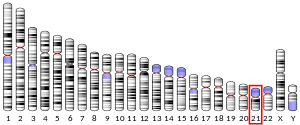RIPK4
Receptor-interacting serine/threonine-protein kinase 4 is an enzyme that in humans is encoded by the RIPK4 gene.[5][6]
The protein encoded by this gene is a serine/threonine protein kinase that interacts with protein kinase C-delta. The encoded protein can also activate NFkappaB and is required for keratinocyte differentiation. This kinase undergoes autophosphorylation.[6]
Interactions
RIPK4 has been shown to interact with PRKCB1.[7]
References
- 1 2 3 GRCh38: Ensembl release 89: ENSG00000183421 - Ensembl, May 2017
- 1 2 3 GRCm38: Ensembl release 89: ENSMUSG00000005251 - Ensembl, May 2017
- ↑ "Human PubMed Reference:".
- ↑ "Mouse PubMed Reference:".
- ↑ Hattori M, Fujiyama A, Taylor TD, Watanabe H, Yada T, Park HS, Toyoda A, Ishii K, Totoki Y, Choi DK, Groner Y, Soeda E, Ohki M, Takagi T, Sakaki Y, Taudien S, Blechschmidt K, Polley A, Menzel U, Delabar J, Kumpf K, Lehmann R, Patterson D, Reichwald K, Rump A, Schillhabel M, Schudy A, Zimmermann W, Rosenthal A, Kudoh J, Schibuya K, Kawasaki K, Asakawa S, Shintani A, Sasaki T, Nagamine K, Mitsuyama S, Antonarakis SE, Minoshima S, Shimizu N, Nordsiek G, Hornischer K, Brant P, Scharfe M, Schon O, Desario A, Reichelt J, Kauer G, Blocker H, Ramser J, Beck A, Klages S, Hennig S, Riesselmann L, Dagand E, Haaf T, Wehrmeyer S, Borzym K, Gardiner K, Nizetic D, Francis F, Lehrach H, Reinhardt R, Yaspo ML (June 2000). "The DNA sequence of human chromosome 21". Nature. 405 (6784): 311–9. PMID 10830953. doi:10.1038/35012518.
- 1 2 "Entrez Gene: RIPK4 receptor-interacting serine-threonine kinase 4".
- ↑ Chen, L; Haider K; Ponda M; Cariappa A; Rowitch D; Pillai S (June 2001). "Protein kinase C-associated kinase (PKK), a novel membrane-associated, ankyrin repeat-containing protein kinase". J. Biol. Chem. United States. 276 (24): 21737–44. ISSN 0021-9258. PMID 11278382. doi:10.1074/jbc.M008069200.
Further reading
- Bonaldo MF, Lennon G, Soares MB (1997). "Normalization and subtraction: two approaches to facilitate gene discovery". Genome Res. 6 (9): 791–806. PMID 8889548. doi:10.1101/gr.6.9.791.
- Bhr C, Rohwer A, Stempka L, et al. (2000). "DIK, a novel protein kinase that interacts with protein kinase Cdelta. Cloning, characterization, and gene analysis". J. Biol. Chem. 275 (46): 36350–7. PMID 10948194. doi:10.1074/jbc.M004771200.
- Chen L, Haider K, Ponda M, et al. (2001). "Protein kinase C-associated kinase (PKK), a novel membrane-associated, ankyrin repeat-containing protein kinase". J. Biol. Chem. 276 (24): 21737–44. PMID 11278382. doi:10.1074/jbc.M008069200.
- Meylan E, Martinon F, Thome M, et al. (2003). "RIP4 (DIK/PKK), a novel member of the RIP kinase family, activates NF-κB and is processed during apoptosis". EMBO Rep. 3 (12): 1201–8. PMC 1308326
 . PMID 12446564. doi:10.1093/embo-reports/kvf236.
. PMID 12446564. doi:10.1093/embo-reports/kvf236. - Strausberg RL, Feingold EA, Grouse LH, et al. (2003). "Generation and initial analysis of more than 15,000 full-length human and mouse cDNA sequences". Proc. Natl. Acad. Sci. U.S.A. 99 (26): 16899–903. PMC 139241
 . PMID 12477932. doi:10.1073/pnas.242603899.
. PMID 12477932. doi:10.1073/pnas.242603899. - Moran ST, Haider K, Ow Y, et al. (2003). "Protein kinase C-associated kinase can activate NFkappaB in both a kinase-dependent and a kinase-independent manner". J. Biol. Chem. 278 (24): 21526–33. PMID 12676934. doi:10.1074/jbc.M301575200.
- Scanlan MJ, Gout I, Gordon CM, et al. (2003). "Humoral immunity to human breast cancer: antigen definition and quantitative analysis of mRNA expression". Cancer Immun. 1: 4. PMID 12747765.
- Ota T, Suzuki Y, Nishikawa T, et al. (2004). "Complete sequencing and characterization of 21,243 full-length human cDNAs". Nat. Genet. 36 (1): 40–5. PMID 14702039. doi:10.1038/ng1285.
- Adams S, Pankow S, Werner S, Munz B (2007). "Regulation of NF-kappaB activity and keratinocyte differentiation by the RIP4 protein: implications for cutaneous wound repair". J. Invest. Dermatol. 127 (3): 538–44. PMID 17039240. doi:10.1038/sj.jid.5700588.
External links
- RIPK4 human gene location in the UCSC Genome Browser.
- RIPK4 human gene details in the UCSC Genome Browser.
This article is issued from
Wikipedia.
The text is licensed under Creative Commons - Attribution - Sharealike.
Additional terms may apply for the media files.




